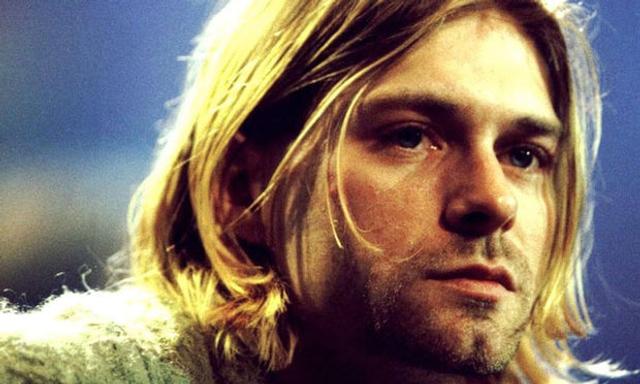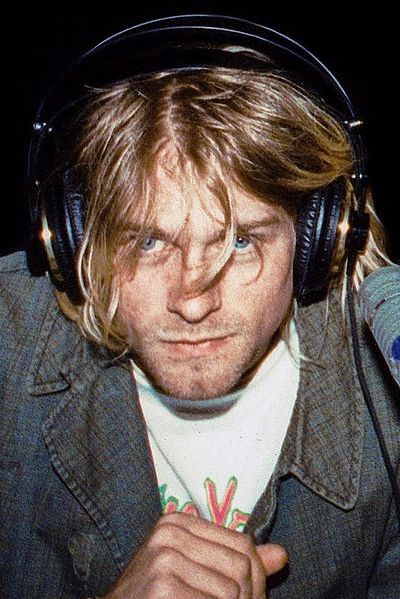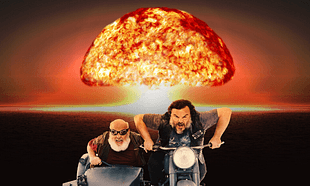Today would have been Kurt Cobain's 46th birthday had he not elected to end his own life on an April evening in 1994. It's difficult to imagine what would have become of him or what he would be like today as a middle-aged man but on that that day in Seattle, Washington we were robbed us of a monumental figure in the music world.
Nirvana were arguably the defining band of the 1990's. They were an act who oversaw the musical transition from trite 80's pop and shambolic frizzy-haired heavy metal to a new grunge, rock and punk - influencing millions along the way. Nirvana's landmark album Nevermind has sold over 30 million copies since its release, putting it in the same company as Pink Floyd's The Wall and The Beatles' Abbey Road.
To mark Kurt's birthday entertainment.ie music editor John Balfe has taken a chronological look through Nirvana's career, beginning with their 1989 debut Bleach all the way to 1994 release of their MTV Unplugged collection and all points in between.
'School', from Bleach (1989)
'School' is out of the standout tracks from Nirvana's aurally-assaulting debut Bleach. The album, and particularly this cut, shows Cobain and Nirvana at their most raw and bombastic, with many of the album's lyrics themed around incidents and people in Cobain's life. 'School', despite being quite lyrically sparse, was Cobain's diatribe against the insular music scene in Seattle and particularly Sub Pop - the label who released the album.
'About A Girl', from Bleach (1989)
Kurt Cobain was a musical sponge, frequently borrowing elements from his favourite bands before filtering them through his own creativity. 'Smells Like Teen Spirit' for example, by his own admission, was Cobain's attempt to write a Pixies song while 'About A Girl' was written after hours spent listening to Meet The Beatles. 'About A Girl' would eventually become known as one of Cobain's best songs thanks to its association with the band's MTV Unplugged album but the song was almost ditched by Kurt years prior because he was uncomfortable disclosing his pop sensibilities to Nirvana's almost exclusively grunge fanbase.
'Lithium', from Nevermind (1991)
'Lithium' is one of the songs which best showcases Nirvana's quite verse/loud chorus philosophy, a trick which the band would use heavily throughout the rest of their short career. While overshadowed by the more radio-friendly 'Smells Like Teen Spirit', 'Lithium' is considered by many Nirvana fans to be the real centrepiece of the album.
'In Bloom', from Nevermind (1991)
The lyrics for 'In Bloom' gave not-so-subtle hints to Kurt's views on the public perception towards his band, directly addressing fans of his who don't understand his message. Another of Nirvana's song which showed off Kurt's penchant for a quiet/loud/quiet song structure, 'In Bloom' was the fourth single from Nevermind and, somewhat ironically, one of the catchiest songs on the album - in direct contrast to Cobain's damning "he's the one/Who likes all our pretty songs/And he likes to sing along/But he don't know what it means" lyrics.
'Aero Zeppelin', from Incesticide (1992)
Cobain's love song to two of favourite bands 'Aero Zeppelin' appears on Nirvana's 1992 compilation album Incesticide, which housed a series of demos, outtakes, radio broadcast recordings and other songs which weren't considered for albums. Interestingly, though Dave Grohl had been a member of Nirvana for two years upon the release of Incesticide, it was former drummer Danny Peters behind the kit for this recording which was done in 1988.
'Aneurysm', from Incesticide (1992)
Nirvana connoisseurs will recognise 'Aneurysm' as the b-side to 'Smells Like Teen Spirit', though the Incesticide version differs to that of the b-side - it's faster, more up-tempo. Not only is that, 'Aneurysm' also regarded by a lot of Nirvana fans as the band's best song not to make it on to either Nevermind or In Utero. As with some of the best songs ever written, 'Aneursym' is about love - specifically Kurt's ex-girlfriend Tobi Vail of Bikini Kill.
'Serve The Servants', from In Utero (1993)
"Teenage angst has paid off well/Now I'm bored and old". Never has an album's opening line fired off such a band-defining salvo as the first refrain in 'Serve The Servants'. As was so often the case with his music, Cobain didn't waste a moment in addressing his perception of the massive success which followed Nevermind and the media-intrusion which followed and that is particularly evident in this song. In Utero was an album which divided Nirvana fans who were anticipating the same slickly-produced rock which was present on Nevermind. Instead of repeating that, Cobain sought out former Pixies collaborator Steve Albini to record and mix the album, resulting in a far rawer and edgier sound.
'Heart-Shaped Box', from In Utero (1993)
Celebrated beat generation writer - and a hero of Kurt's - William S. Burroughs was invited to appear in the music video for 'Heart-Shaped Box' (he declined) but did spend time with Cobain in the year before his death. During one of these meetings Burroughs pored over the In Utero lyrics sheet, noting its dark resonance - particularly that of 'Heart-Shaped Box'. After his suicide, Burroughs said of Cobain: "The thing I remember about him is the deathly grey complexion of his cheeks. It was an act of will for Kurt to kill himself. As far as I was concerned, he was dead already."
'The Man Who Sold The World', from MTV Unplugged In New York (1994)
Recorded five months before Cobain's death, Nirvana's MTV Unplugged session bucked the trend which the show had established up to that point - named bands performing nothing but their big hits - in favour of a selection of lesser-known tracks and cover versions, much to the initial chagrin of MTV. The result was one of the most poignant live recordings of the nineties and Cobain's take on 'The Man Who Sold The World' by David Bowie has become so well-known that Bowie has had to explain on stage that it's not a Nirvana song. Cobain was suffering from heavy drug withdrawal in the lead-up to the performance, prompting one observer to say that "there was no joking, no smiles, no fun coming from him..."
'Where Did You Sleep Last Night?', from MTV Unplugged In New York (1994)
The final track from Nirvana's MTV Unplugged session, 'Where Did You Sleep Last Night' is originally a song by blues pioneer Lead Belly but will likely now forever be associated with Cobain and Nirvana. So powerful was the performance that when the MTV producers began insisting on an encore Cobain refused, knowing that they could never top what they had just done - a haunting climax to an incredible performance.


















































































